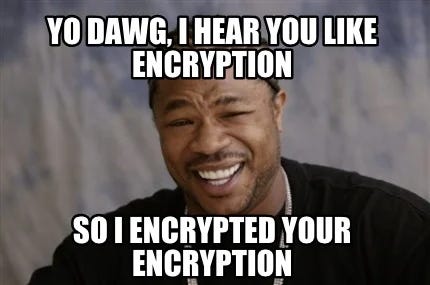The Encryption Psyop
what you thought was safe and secure just turned out to be another mind game
Originally posted May 16, 2014 on the Unseen.is blog, with edits
Looking back in hindsight at this blog post from almost ten years ago, it is now obvious to me that encryption is being used as a psyop to convince people they are “safe and secure” when they use approved software/technology. In reality, the public is only allowed to use technology that can be tracked, monitored and turned off at will by someone. This goes for your computers, cars, appliances and phones. The “Internet of Things” and soon “The Internet of People” will have all of these “features”.
**************
We’ve met some VERY interesting people in our journey with Unseen.is. We’ve connected with active hackers, cryptographers, former contractors (not Edward Snowden, but people like him in some regards), technologists at the largest companies, etc. People are all fascinated by what we’re trying to do — it’s really a work in progress, but it gets better every day. The goal of course is to give people some real security for their valuable communications.
When we tell people “if it’s publicly available, it’s already cracked”, quite a few people don’t believe us. That’s OK, you just haven’t had a chance to listen in on the conversations we’ve had with people in a position to know what’s really happening. There is theory and then there’s reality. We look at the results.
One person we’ve spoken to told us there were four kinds of encryption;
1. Toy encryption. This is stuff used by school kids and is so easy to break, it’s like a joke. Sadly, some of this kind of very weak stuff is still in use where stronger crypto should be used.
2. Pretty Good Encryption. This is allowed to be exported around the world and it’s all broken by the major security services who have distributed tools to other countries and probably by some of the largest criminal gangs, too. It includes the standard encryption most people know about, i.e. RSA, AES, SSL, etc.
3. Bank Grade Encryption. These are less publicly known or less crippled algorithms used by the largest corporations and banks that need real security. Export is strictly forbidden from the US, though local laws vary in different countries. Not easy to find.
4. Weapon. This is the highest grade and the security agencies consider this to be a weapon on par with atomic weapons and those kinds of secrets. We’ve known a couple of people who were told to stop working in cryptography. They either join the “team” or shut down. There is no private business in weapons grade cryptography.
Who said this? The CTO of a modestly large cell carrier. After he asked if we “had a bodyguard”.
Are “weapons” like this illegal? Actually, isn’t that admitting that the pen is indeed mightier than the sword? How could something that’s purely defensive, like encryption, be used offensively like some kind of weapon? Isn’t that changing the definition to control the discussion and twist the meaning? That’s the sort of thing they used to do in the former Soviet Union under communism, turn the truth on its head purely for political gain and more power over people. We don’t see how encryption could ever be a “weapon”, it’s really just an envelope other people can’t open. So in that regard it’s more of a shield that can be used to protect your personal, owned by you information.
In the U.S., the first amendment lets you have freedom of speech and it doesn’t say how you have to speak. People there are also allowed to own real weapons — quite a few people own and carry guns in the U.S. We were told that you might win in court there, as none of these things are against the law in most places (from what our lawyers tell us) and they are all definitely legal in Iceland. However, there is a point where things go “beyond the legal system” and extra-legal violence becomes reality. Night time visitors carrying flashlights in the dark and that sort of thing.


